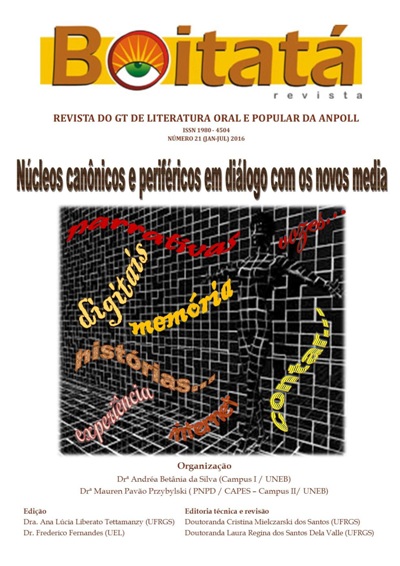The contraculture and peripheral literature relationship in groups of young people from brazilian favelas: possible dialogues
DOI:
https://doi.org/10.5433/boitata.2016v11.e31256Keywords:
Counterculture, Young, Peripheral Literature, Cultural diversity,Abstract
T: Cultural groups of our suburbs carry positions which greatly resemble the canon recognizes as postmodern thought and the foundations of the counterculture (the pleasure principle, valuing attitudes and rebellion). Reflection on the counterculture movement in Brazil in the 60s and 70s and their reflections in contemporary society, particularly in relation to peripheral literature, is the object of this work, which will start with a reflection on some slum youth groups seeking reveal their identities without victimizing; on the contrary, are the protagonists of their life stories through the territorial claim their home communities. Considering the emergence of narratives from peripheral nuclei, and taking as an example of analysis Grupo Cultural Olodum, nonprofit and public utility, founded in 1979 and operates in the cultural and social scene of Salvador / Bahia, broadcasting artistic and technical knowledge and awakening in children and young people's sense of identity through the promotion of respect for cultural diversity and human uniqueness, this article aims to tighten the contemporary movements of counterculture as not only asDownloads
Download data is not yet available.
References
APPIAH, Kwame Anthony. O pós-colonial e o pós-moderno. In: Na casa de meu pai: a África na filosofia da cultura; tradução Vera Ribeiro. Rio de Janeiro: Contraponto, 1997, p.193-219.
CÍCERO, Antonio. Encontros e desencontros com a contracultura. In: “Por que não?”: Rupturas e continuidades da contracultura. Rio de Janeiro: 7Letras, 2007, p.54-63.
FINNEGAN, Ruth. O significado da literatura em culturas orais. In: A tradição oral. Belo Horizonte: Viva Voz, 2006, p. 66 a 107.
HALLBWACHS, Maurice. A memória coletiva. Tradução Beatriz Sidou. São Paulo: Editora Centauro, 2006.
HOLLANDA, Heloísa Buarque de. Impressões de Viagem – CPC, Vanguarda e Desbunde 1960/70. 5. ed. Rio de Janeiro: Aeroplano, 2004.
MIGNOLO, Walter D. Desobediência epistêmica: A opção descolonial e o significado de identidade em política. Cadernos de Letras da UFF ,n. 34, p. 287-324, 2008.
MESCHONNIC, Henri. Linguagem ritmo e vida. Extratos traduzidos por Cristiano Florentino. Revisão de Sonia Queiroz, Belo Horizonte, 2006, p. 1-68.
RAMOS, Silvia. Jovens de favelas na produção cultural brasileira dos anos 90. In “Por que não?”: Rupturas e continuidades da contracultura. Rio de Janeiro: 7Letras, 2007. p. 239-256.
SANTOS, Boaventura de Souza. Modernidade, Identidade e Cultura de Fronteira. In: Pela mão de Alice. O social e o político na pós-modernidade. Porto: Edições Afrontamento, 7 ed. 1999, p.119-137.
ALMEIDA, Armando. A Contracultura e a Pós-Modernidade. Disponível em: http://tropicalia.com.br/v1/site/internas/producao01.php. Acesso em: 03 mar. 2016.
A questão agora é outra. Disponível em: http://www.heloisabuarquedehollanda.com.br/aquestao-agora-e-outra/. Acesso em: 20 mar.2016.
NASCIMENTO, Márcia; CASA NOVA, Vera. A Literatura da Periferia de BH. Belo Horizonte: Viva Voz, 2012. Disponível em: http://www.portaldepoeticasorais.com.br/site/textos/A_literatura_da_periferia_de_BH_site2.pdf. Acesso em: 03 mar. 2016.
CÍCERO, Antonio. Encontros e desencontros com a contracultura. In: “Por que não?”: Rupturas e continuidades da contracultura. Rio de Janeiro: 7Letras, 2007, p.54-63.
FINNEGAN, Ruth. O significado da literatura em culturas orais. In: A tradição oral. Belo Horizonte: Viva Voz, 2006, p. 66 a 107.
HALLBWACHS, Maurice. A memória coletiva. Tradução Beatriz Sidou. São Paulo: Editora Centauro, 2006.
HOLLANDA, Heloísa Buarque de. Impressões de Viagem – CPC, Vanguarda e Desbunde 1960/70. 5. ed. Rio de Janeiro: Aeroplano, 2004.
MIGNOLO, Walter D. Desobediência epistêmica: A opção descolonial e o significado de identidade em política. Cadernos de Letras da UFF ,n. 34, p. 287-324, 2008.
MESCHONNIC, Henri. Linguagem ritmo e vida. Extratos traduzidos por Cristiano Florentino. Revisão de Sonia Queiroz, Belo Horizonte, 2006, p. 1-68.
RAMOS, Silvia. Jovens de favelas na produção cultural brasileira dos anos 90. In “Por que não?”: Rupturas e continuidades da contracultura. Rio de Janeiro: 7Letras, 2007. p. 239-256.
SANTOS, Boaventura de Souza. Modernidade, Identidade e Cultura de Fronteira. In: Pela mão de Alice. O social e o político na pós-modernidade. Porto: Edições Afrontamento, 7 ed. 1999, p.119-137.
ALMEIDA, Armando. A Contracultura e a Pós-Modernidade. Disponível em: http://tropicalia.com.br/v1/site/internas/producao01.php. Acesso em: 03 mar. 2016.
A questão agora é outra. Disponível em: http://www.heloisabuarquedehollanda.com.br/aquestao-agora-e-outra/. Acesso em: 20 mar.2016.
NASCIMENTO, Márcia; CASA NOVA, Vera. A Literatura da Periferia de BH. Belo Horizonte: Viva Voz, 2012. Disponível em: http://www.portaldepoeticasorais.com.br/site/textos/A_literatura_da_periferia_de_BH_site2.pdf. Acesso em: 03 mar. 2016.
Downloads
Published
2016-12-11
How to Cite
Perez, V. V., & Przybylski, M. (2016). The contraculture and peripheral literature relationship in groups of young people from brazilian favelas: possible dialogues. Boitatá, 11(21), 100–115. https://doi.org/10.5433/boitata.2016v11.e31256
Issue
Section
Dossiê
License
Copyright (c) 2016 Boitatá

This work is licensed under a Creative Commons Attribution 4.0 International License.
Boitatá esta licenciada com CC BY sob essa licença é possível: Compartilhar - copiar e redistribuir o material em qualquer suporte ou formato. Adaptar - remixar, transformar, e criar a partir do material, atribuindo o devido crédito e prover um link para a licença e indicar se mudanças foram feitas.




















